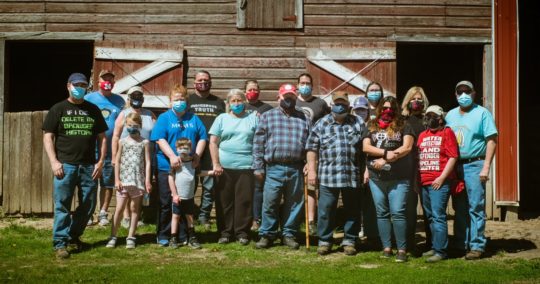Below is Bold Nebraska director Jane Kleeb’s written testimony as submitted to Congress for the Sept. 19, 2013 hearing (“Keystone’s Red Tape Anniversary“) of the U.S. House Energy & Commerce’s Subcommittee on Commerce, Manufacturing and Trade. Watch the hearing live at 9:15 AM CT at this link: http://energycommerce.house.gov/studio/webcasts


Testimony of Bold Nebraska Executive Director Jane Kleeb
Hearing of House Energy & Commerce Committee
Subcommittee of Commerce, Manufacturing and Trade
“Keystone’s Red Tape Anniversary” | Sept. 19, 2013


Looking at job records on Keystone 1 and TransCanada’s Gulf Coast Segment proves states see about 800-900 relocated and short-term workers and about 100 local folks get jobs for 6 months to a year. While those are good jobs, it’s nowhere near TransCanada’s false promise of jobs for Keystone XL.
In April 2010, the Deepwater Horizon platform exploded and sank into the Gulf of Mexico, claiming 11 lives and releasing 5 million gallons of oil. Within ten days of capping the BP well, Enbridge’s tarsands pipeline in Michigan ruptured and filled the Kalamazoo River with toxic, cancer causing chemicals. In 2013, tarsands literally ran down the streets in Arkansas. All of a sudden our state and our nation are now focused on the economic risk that Keystone XL would bring to the largest freshwater resource in North America, the Ogallala Aquifer.
Our state’s economic backbone is based on Agriculture. Our famers and ranchers livelihoods rely on clean and abundant water from the aquifer. We are the number one state in the nation in irrigated acres, and that is only because of this vast resource.
There has never been a worst-case scenario risk analysis for our water. And yet, TransCanada admits their pipeline could spill at least 1.3 million gallons of tarsands and chemicals. That’s an eye-catching number, because 1.3 million gallons happens to be about the size of the Kalamazoo River spill in Michigan, which Chairman Upton knows this tragedy first hand.
It’s been three years, the total cost is over $1 billion, and it is still not cleaned up because tarsands are clinging to the edges and bottoms of the Kalamazoo River. Over 200 families had to give up their homes, and residents have been cautioned against swimming in the river or eating its fish.
We are deeply worried that our rivers and our irreplaceable aquifer will be the next Kalamazoo River, the next Gulf of Mexico, or the next Mayflower, Arkansas.
America’s national interest is not served by a project that lines the pockets of the few, while risking the livelihoods and the lives of many.
Our families live in rural America because we like our way of life. We can see the stars, we can drink from wells filled by the aquifer, and we can gather by the river to see the annual migration of the Sandhill Cranes. The Department of the Interior tells us that Keystone XL puts all of this at risk. We knew this from Day One of TransCanada’s application.
TransCanada poured millions into the political process in Nebraska, passing an eleventh-hour pipeline routing law that violates the state constitution and is currently in court. Eminent domain powers were granted solely to the governor who at one point had to return an illegal campaign contribution from TransCanada.
TransCanada uses eminent domain to intimidate landowners into accepting unfair deals. It’s been reported in the press that TransCanada has threatened to level people’s homes if they don’t cooperate. They do all of this with a smile and a promise to be good neighbors.
When you know this is an export pipeline, that uses foreign steel, gets refined by countries like Saudi Arabia and Venezuela, increases gas prices in the Midwest and the company treats our neighbors unfairly, you can see why the opposition is only growing stronger.
TransCanada is asking landowners to take on unnecessary risk, so we’re asking you to intervene. See their massive lobby campaign for what it is: a Hail Mary pass because TransCanada made a bad investment in tarsands and is now dependent on international exports. TransCanada is part of an industry so greedy that they’re willing to say anything to get this pipeline pushed through in order to open the floodgates to more and more tarsands pipelines crisscrossing our great country.
By your clock, it has been five years. And yet, we still do not have all the risks analyzed. Time allows us to dig into the issues that you are asking our families to live with forever. A risk to agricultural production of Nebraska—or the other Midwestern states that border us and share the Ogallala Aquifer—can easily turn into a catastrophic economic impact.
Last weekend, just west of tiny Benedict, Nebraska, a group of landowners and concerned citizens started building a solar-powered barn and a wind turbine in the path of the Keystone XL. With drills and hammers, with sturdy backs and their own two hands, they set to create safe and renewable energy.
Our community’s barn project will put more energy on Nebraska’s grid than TransCanada’s Keystone XL pipeline ever will. We know you want to leave a legacy worth sharing, an economic future that is strong. A pipeline won’t fix our economy, but this pipeline can break our families’ economic futures. Stand with us in saying no to Keystone XL and yes to the very sprit of the homesteaders who built our great state.
*(photo of Jane Kleeb by Mary Anne Andrei)



